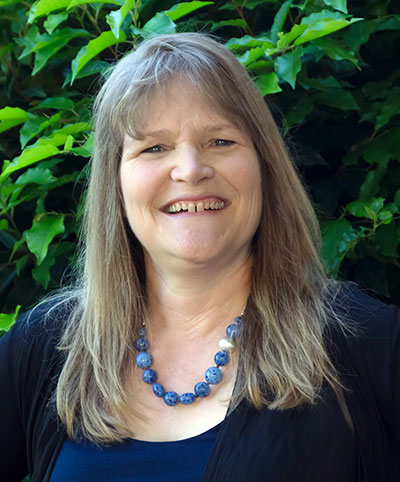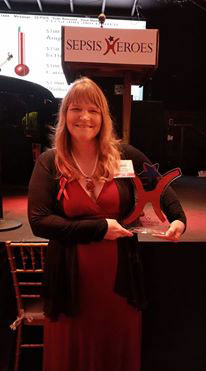Sharon Hanson, '14, Named National "Sepsis Hero"
Sharon Hansen, UW Tacoma nursing alumna and lecturer, has been recognized by the Sepsis Alliance for her work to raise awareness of sepsis and post-sepsis syndrome.

The Sepsis Alliance is the leading national non-profit dedicated to raising awareness of sepsis. The Alliance describes sepsis as “the body’s overwhelming and life-threatening response to infection which can lead to tissue damage, organ failure, and death,” and says that sepsis “kills 258,000 Americans each year.”
This year, at its 7th Annual Sepsis Heroes Gala earlier this month in New York City, the Alliance recognized Sharon Hansen, UW Tacoma alumna, MultiCare Health Systems educator and a lecturer in the Nursing & Healthcare Leadership Program, as a “sepsis hero” for her work educating nurses and health professionals about sepsis and post-sepsis syndrome.
Becoming an Educator
Hansen received her BS degree in nursing from Pacific Lutheran University and began her career in 1988 as a staff RN at Good Samaritan Hospital in Puyallup, Wash. “When Good Samaritan affiliated with MultiCare, I took a full-time educator position,” she said. “I realized I needed to further my understanding of how to be an educator.”
“UW Tacoma, from which I received my Master Nursing, was a great fit for me personally and professionally. I could not have been successful without the support and guidance of Dr. Sharon Gavin-Fought and my other professors.”
The Commendation
The Sepsis Alliance issued the following commendation, which we reprint with permission.

Sharon Hansen, RN, MN, CCRN, is a lecturer in the UW Tacoma Nursing & Healthcare Leadership Program, but it is her work in raising sepsis awareness that resulted in her being named as a 2018 Sepsis Hero.
Nurses often have a few patients that leave a lasting impression. “In 2010, there was a young man who passed away from sepsis,” Sharon says. “He still is one of the faces I see when I teach about sepsis recognition and resuscitation. As a result of his case, an emergency department educator and I developed and taught a class for the emergency and critical care departments.” Sharon went on to learn about Sepsis Alliance and became an important part of the Sepsis Alliance volunteer team, working on different projects such as presentations for the general public and webinars for healthcare professionals, giving her time whenever possible.
Sepsis also touched Sharon personally, when her husband developed sepsis in 2003 and she saw first-hand its effects not only during the acute illness, but in the months following, as he struggled to recover. He is one of up to 50% of survivors who are affected with post-sepsis syndrome. This personal point of view makes Sharon’s teaching even more vital, as she understands the personal cost of sepsis.
When told that she was named a Sepsis Hero, Sharon said she was incredibly humbled and honored. “This award is really about the amazing family I have and our journey,” she says. “It is about working for MultiCare Health System and UW Tacoma. Both these organizations and the teams I work with have supported me through extremely difficult seasons and have provided me with the opportunity to grow in understanding and teaching ability.”
Teaching
At UW Tacoma, Hansen teaches courses in clinical nursing phenomena, interpersonal communication and an overview of health care systems. As the commendation suggests, Hansen’s family’s personal experience with sepsis is something she brings into her teaching.
“My husband’s journey affects so much of what I teach,” she said. “I am able to bring elements of his and our family’s experience into the classroom. I am passionate about nurses thinking critically, of looking beyond the moment and the task. I encourage students to be present with the individuals they care for, to listen. With that comes the paramount need for nurses to care for themselves, to maintain their own physical, mental, and—if you will—‘soul’ health.”
“My goal is to continue to raise awareness of sepsis,” said Hansen, “with a focus on early recognition, intervention and care of the patient and family post-sepsis.”



